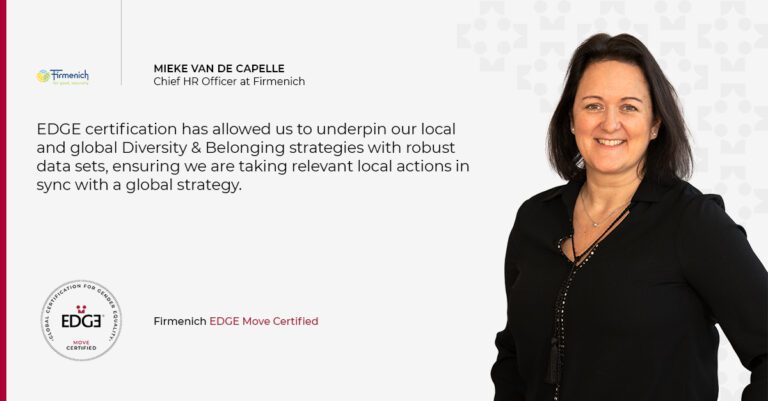EDGE Certified companies are serious about putting gender and intersectional equity at the heart of their business strategy. We sat down with Mieke Van de Capelle, Chief HR Officer at Firmenich, to ask about today’s hot topics in HR, such as valuing Human Capital, workplace virtualization, employee engagement and tangible business results.
The future of work: How are HR departments dealing with the huge digitalization/virtualization of workplaces that’s taking place because of the pandemic? Is this an opportunity to rebalance the talent pipeline by upskilling and reskilling and repositioning female talents to meet the new workplace’s requirements?
Mieke: The Covid pandemic has been a test for companies and has shown the importance of social capital. Companies that have successfully created shared values and models to work together, like Firmenich, came out as winners. We secured business continuity while transforming how and where we work.
Digitalization and virtualization have been quite disruptive, however, we did not consider this a threat. It gave us the opportunity to focus on impact and performance, and determine which types of work require an in-office presence versus the ones that are more suited for virtual work. It helped us enable employees to make smarter choices to be more productive and efficient, and further build a company-wide culture of accountability and responsibility.
During Covid we continued investing in our people, and provided hundreds of hours of leadership training. We increased our virtual offering, to ensure digital literacy for all and address specific uncertainties through virtual wellness sessions.
Developing a range of new digital skills will help us foster an inclusive work environment. There is significant pressure on recruitment and retention, and highly-skilled talents are sought-after, which requires us to think out of the box, upskill talent and provide them with the digital skills that people need in tomorrow’s world of work.
A positive aspect of our new hybrid work models is that it also brings benefits to the society at large. We believe digitalization can help create a level playing field. Workplace virtualization can be empowering and an opportunity to be intentional around positioning female talents in direct individual conversations on how to balance work and personal needs – the very same goes for men by the way. Virtual also means there is less ‘standing tall’ in the meeting room, or ‘imposing oneself’, etc. and this may turn a hurdle (working form home) into a springboard (career progression).
However, we also see great risk and must pay attention to retain women who still carry the majority of the double burden to manage work and family life. The largest share of the burden continues to fall on their shoulders, regardless of their level of education and income. So despite workplace virtualization levelling the playing field, we should not take the progress that has been made for granted. We must continue to fight gender-based stereotypes especially in a virtual workplace.
How does Firmenich align their internal pursuit of gender balance, diversity & inclusion with their investment activities? Which are the factors that could contribute to a large-scale adoption of gender balance, D&I in the workplace and on Boards as key ESG scoring & reporting indicators?
Mieke: Across all our investments, whether new sites or R&D, we follow industry-leading responsible policies, including Code of Ethics, Anti-Corruption, Global Environmental Policy, Occupational Health & Safety, Diversity & Belonging, and Supplier Expectations.
In line with our ESG ambitions, we developed a responsible investment strategy that we also apply to our own Firmenich pension fund in Switzerland. This fund has over CHF 1 billion in assets under its management. The approach will ensure that our ESG criteria are reflected in our responsible investment strategy. For example, we exclude tobacco, fracking, gambling, etc. from our investment portfolio.
We believe that investing in gender equality creates positive impact, delivering positive long-term financial performance combined with sustainability.
There is still work to be done in this space. We want to raise the bar on effective diversity and inclusion beyond Boards & C-suite female representation, and extend reporting indicators beyond these two levels. We will add fresh scrutiny to our pipeline across Senior Managers and Directors, focus on legislative framework on diversity representation across organizational levels, mandate pay and development equity reporting, and public disclosure.
How can the HR function gain empowerment from being EDGE certified, how is the team supported by access to the toolbox/dashboard and can accelerate equity?
Mieke: Firstly, there is a clear connection between employee engagement and tangible business results. We know that more diverse teams are more innovative, engaged, and creative in their work.
Secondly, as a business-to-business company, we work with the world’s leading brands, and certification is an essential component to be shortlisted on our customer’s supplier roster.
Thirdly, EDGE certification gives us credibility with financial stakeholders. Investors are increasingly disregarding bond issuers that do not meet exceeding ESG criteria. Our certification is an important component in our value proposition for the investment community.
Lastly, EDGE certification has allowed us to underpin our local and global D&B strategies with robust data sets. The HR community at divisional and local levels, as well as Leadership teams, elicit EDGE country results to support local D&B strategies, and ensure the latter are aligned with the company’s global strategy.






